Advance CTE serves as a steering member of the College in the High School Alliance,a coalition of national, state, and local organizations collaborating to enable high school students to enroll in authentic, affordable college pathways toward postsecondary degrees and credentials offered with appropriate support. This blog, the second in a series, highlights the CHSA’s Unlocking Potential guide that elevates findings and work states are doing to design and deliver high-quality college in the high school programs.
Resource Overview
College in High School Alliance (CHSA)’s Unlocking Potential: A State Policy Roadmap for Equity & Quality in College in High School Programs provides a comprehensive set of policy recommendations for states looking to expand equitable access to college and high school programs. This guide provides policy recommendations as well as actionable items for state and local administrators and concludes with other examples of state tools and resources.
Background:
College in High School Alliance defines college in high school programs as dual enrollment, concurrent enrollment, and early college high school. These programs are formed via partnerships between school districts and accredited institutions of higher education to provide high school-age students postsecondary experiences that lead to college credentials or degrees.
The number of students participating in College in High School Programs has increased to provide opportunities to more than 5.5 million secondary learners, with Career Technical Education (CTE) courses making up one-third of enrollments (1). While these programs have proven popular and in high demand, enrollment demographics do not reflect the full diversity of the learner population. Significant opportunity exists for reducing barriers to accessing College in High School Programs for all learners, especially those in low-income communities, learners of color, learners from rural communities and first-generation college-goers.
Unlocking Potential provides recommendations and highlights work for state policies that advance the goals of equity and quality for college in high school programs in six categories:

The numbers in the image represent page numbers from the resource guide, per each category.
- Equity Goal and Public Reporting:
- Set an equitable and statewide public goal for increasing the participation and success of traditionally underserved learners in the early postsecondary groups
- Disaggregate public reporting and accountability for progress toward the goal
- Practices in Louisiana, Montana, Minnesota, and Washington are highlighted
- Program Integrity and Credit Transfer:
- Support and promote high-quality early postsecondary opportunities
- Create cross-sector partnerships between secondary and postsecondary teams
- Create articulation agreements to remove barriers on student transfer opportunities
- Practices in California, Colorado, Florida, Louisiana, Minnesota and Texas are highlighted
- Finance:
- Design funding mechanisms that remove financial barriers for low-income and moderate-income students who want to participate in early postsecondary opportunities
- Practices in Arkansas, Georgia, Nebraska, Utah, Vermont and Washington are highlighted
- Course Access and Availability:
- Remove course access and availability barriers for all learners
- Maximize learners’ college credit attainment experiences through international pathway opportunities and by providing academic and career exploration opportunities
- Practices in Colorado, Florida, Georgia, Kentucky, Maine and Virginia are highlighted
- Instructor Capacity
- Develop strategies to recruit, provide support, and diversify the pool of instructors with the appropriate qualifications to teach college in high school programs
- Create high-quality partnerships between K-12 and postsecondary partners as college in high school programs
- Scale college in the high school programs and create sustainability
- Practices in Hawaii, Kansas, Minnesota and Ohio are highlighted
- Navigator Support:
- Prioritize student navigational support.
- Enhance the current advising mechanisms.
- Practices in California, Colorado, Montana, Ohio and Tennessee are highlighted
The policy recommendations are presented along a continuum: foundational, advanced, and exceptional policies. Foundational policies are those that every state must have to best support its learners.
For example, under the Equity Goal and Public Reporting, Every Student Succeeds Act (ESSA) data reporting requirements would be considered a foundational policy. On the other end of the spectrum, states can enhance these same data reporting requirements by creating tool kits and providing technical assistance to empower local use of data to remove barriers for learners and create more equitable programs.
To learn more about how CTE early postsecondary opportunities (EPSO) such as dual enrollment serve learners, check out Advance CTE’s report on The State of CTE: Early Postsecondary Opportunities. This 50-state report, provided in partnership with College in the High School Alliance reveals key findings on how EPSOs serve CTE learners and provides recommendations for state leaders to leverage state infrastructure and collaboration to advance equity in these experiences.
Suela Cela, Senior Policy Associate


 As part of ongoing blog topics providing updates on this initiative, Deshaun Mars, Vice President, Global Philanthropy (Job Skills,) and Brice Thomas, Policy Associate engaged in a discussion to highlight JPMC’s view of the initiative and how this work advances JPMC’s philanthropic portfolio and ultimately building high-quality local and state career pathway systems.
As part of ongoing blog topics providing updates on this initiative, Deshaun Mars, Vice President, Global Philanthropy (Job Skills,) and Brice Thomas, Policy Associate engaged in a discussion to highlight JPMC’s view of the initiative and how this work advances JPMC’s philanthropic portfolio and ultimately building high-quality local and state career pathway systems.  Pennsylvania
Pennsylvania Texas
Texas Ohio
Ohio
 In March 2021, Advance CTE released
In March 2021, Advance CTE released 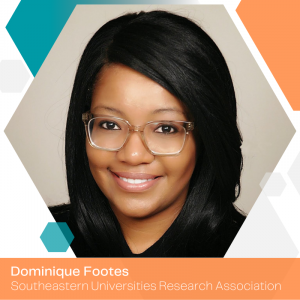

 Davil Jackson (California) is passionate about empowering youth and young adult learners and has si
Davil Jackson (California) is passionate about empowering youth and young adult learners and has si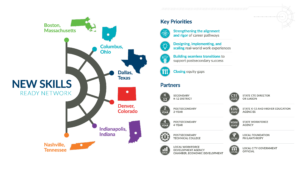
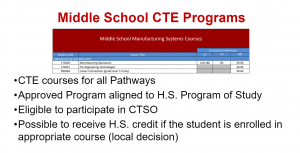 Career advising and development supports geared towards middle grades learners to improve access and achieve high-quality and equitable secondary CTE programs prove to be an early opportunity to develop an occupational identity and better build social capital. Ohio discussed the policy structures the state has put into place to support learners in CTE programs before they enter high school, including funding mechanisms and alignment of middle grades programs of study. Michigan Advance CTE-ECMC Fellow
Career advising and development supports geared towards middle grades learners to improve access and achieve high-quality and equitable secondary CTE programs prove to be an early opportunity to develop an occupational identity and better build social capital. Ohio discussed the policy structures the state has put into place to support learners in CTE programs before they enter high school, including funding mechanisms and alignment of middle grades programs of study. Michigan Advance CTE-ECMC Fellow 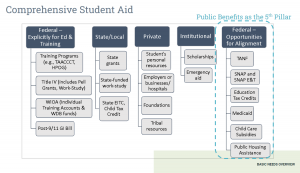 An education consultant and a state leader from Wisconsin provided an overview of programs that support learners basic needs, while elevating that many programs still create barriers for learners to complete credentials. Immediate next steps that were shared included making integrated benefits applications for federal assistance programs available online and inviting benefits coordinators to provide services on campus. Wisconsin highlighted their steps to create affinity groups with faculty and staff, with Dr. Colleen McCabe stating “To understand the effects of poverty, you have to explore learners’ multiple identities.”
An education consultant and a state leader from Wisconsin provided an overview of programs that support learners basic needs, while elevating that many programs still create barriers for learners to complete credentials. Immediate next steps that were shared included making integrated benefits applications for federal assistance programs available online and inviting benefits coordinators to provide services on campus. Wisconsin highlighted their steps to create affinity groups with faculty and staff, with Dr. Colleen McCabe stating “To understand the effects of poverty, you have to explore learners’ multiple identities.” Congress Remains in Recess Ahead of Midterm Elections
Congress Remains in Recess Ahead of Midterm Elections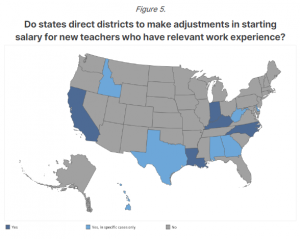
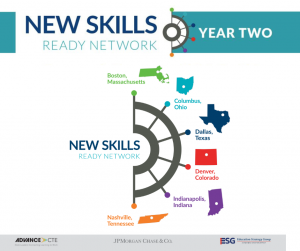 Today, Advance CTE and Education Strategy Group (ESG) released an annual report and site snapshots for year two of the
Today, Advance CTE and Education Strategy Group (ESG) released an annual report and site snapshots for year two of the 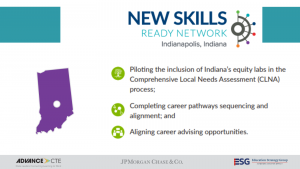
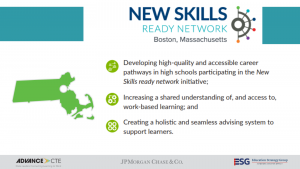 Boston, Massachusetts,
Boston, Massachusetts,